- Home
- Bruce Sterling
Zeitgeist Page 2
Zeitgeist Read online
Page 2
Wiesel was visibly twitching. Celebrity bored him, but the lure of a well-planned hustle was more than Wiesel could withstand.
Then something caught Wiesel’s gimlet eye, and an expression of relief flooded his face, giving it an almost human cast. He rotated smartly on his rubber heel.
A motorized wheelchair had arrived at the baggage claim. It bore a woman in an off-the-shoulder Lycra stretch dress. She wore a blond wig: a bubble-headed cut with a broad wing of bangs. She had big blue eyes, and enormous breasts, which rose from her torso with the taut inflated look of sports equipment.
The wheelchair eased to a buzzing halt. Its female occupant looked Starlitz up and down, taking in his lime-green linen suit, the diamond pinky ring, the Gucci shoes.
Slowly, she emitted a stream of smoke. “Friend of yours, Benny?”
“It’s business, Princess.” Anxious to please, Wiesel stiffened. “This is Leggy.”
“Lech Starlitz.” Starlitz cordially offered his hand. The woman switched hands with the cigarette, absently wiped ash into the glittering Lycra fabric on her meaty thigh, and gave Starlitz’s fingers a damp, condescending squeeze.
“You can call me ‘Diana,’ ” she told him. “Most people do.”
“Is it dystrophy?” Starlitz asked her.
She smiled. “Nah.”
“Multiple sclerosis?”
“Nope!”
“It couldn’t be BSE.”
“Aw, fuck no! I don’t eat hamburgers, I’m a fuckin’ dancer!”
“It’s autoimmune syndrome,” Wiesel offered. “She’s allergic to herself.” He jerked one thumb at the luggage track. “I got her CAT scans with us. I got her full NMR scans. You should see all my prints, Leggy. They’re beauties.”
The woman pointed one lacquered finger. “My bags, Benny. Go get the damn bags.”
“Yes, Your Highness,” Wiesel said. He sidled off through the crowd and began to wrestle with an extensive set of yellow hard-shelled cases.
“Lotta luggage,” Starlitz remarked to the Princess.
“Yeah. We’re moving. We’re leaving London, we’re off to play housie together. Me and the king of voyeurs there.”
“Any idea where you’re going, Your Highness?”
She puffed her cigarette, and looked up, squinting. “You ever been to Goa, Mr. Starlitz?”
“Goa’s very happening,” nodded Starlitz. “Got its own sound named after it.”
She blinked. “What sound’s that, then?”
“Well, it’s the ‘Goa Sound.’ ”
“Well, what is it?”
“There’s a big trance-and-dance scene in Goa. A lotta techno action there.”
The Princess just wasn’t getting it.
“Techno, you know? I mean electronica.”
No comprehension there at all.
“Music,” Starlitz insisted. “Party tracks that people play off tapes and mixers. Sampling. Break-beat.” Starlitz went up a final level. “In Goa they play a lot of disco.”
She brightened. “Oh, yeah. Party music.”
“Yeah. That’s the big trendy pitch there in Goa, that’s the story.”
“Any strip clubs in Goa? That’s in India, right? Do they do exotic dancing there? Any specialty impersonation acts?”
“Lotta nude beaches in Goa.”
She sighed. “Friggin’ hippie amateurs are always spoilin’ my scene.”
Wiesel pulled over one of the big yellow cases, lugging it two handed. The grainy plastic case was covered with duct tape and bungee cords, and its sides bulged ominously. “They have Ayurvedic medicine in Goa,” he puffed. “Ayurveda, that’s the herbal wisdom of the ages! It’s real progressive!”
“Yeah, I’ve heard a lot about that Hindu herbal stuff,” said Starlitz helpfully. “They use a lot of cow urine. Make real sure they sterilize those puncture needles.” He held up two fingers, four inches apart.
Then Starlitz gazed down with fatherly concern into the wheelchair. “You know what you need, Di? For an autoimmune disorder you need a major detox. All natural. They got this woman’s Turkish bathhouse in Edirne. All marble inside, all female staff. Medicated mudpacks. Special mineral water. Hasn’t been a man inside that building in four hundred years. They staff the place with these Assyrian nurses out of the mountains of the Caucasus, where people live to be a hundred and twelve.”
The Princess blinked. “Cor.”
“It’s all about the yogurt, you know? And the massage.”
She had a last puff and dropped the smoldering butt near Wiesel’s shoe. “Where did you say this was?”
“Nearby. Outside Istanbul. Of course, they’re booked up years ahead. They’re very strict Moslems, they don’t do Christian women. You gotta be the Sultana Valide Roxana to book a room in that joint.”
“We’re booked for Goa,” Wiesel insisted, loyally stomping the Princess’s cig stub.
“Oy,” the Princess protested, “I can go for Moslems! If they’ve got heaps of money, that is.”
Starlitz gripped the bony shoulder of the paparazzo’s flimsy raincoat. “Wiesel,” he told him soberly, “you see that luggage conveyor track? There just might be an unmarked black valise waiting for you there. With twenty thousand dollars U.S. in it.”
Wiesel and his Princess exchanged significant glances.
“But there isn’t.” Starlitz reached into his lime-green waistcoat pocket, and came out with a gold plastic rectangle. “Because cash is yesterday. Customs people are very down on cash now. So instead I brought you this handy Visa card. It’s made out in your favorite name. With a twenty-thousand-dollar line of credit from an offshore bank in Turkish Cyprus.”
Wiesel reached out reflexively, then restrained himself. “How do I know that’s true?”
“You can call their toll-free number, pal. It’s printed here on the back of the card. Cyprus is a Commonwealth country, so Cypriot bankers always speak great English. You can call the bank first thing, from the suite that I booked you at the Istanbul Pera Palace.”
Wiesel grunted. “Christ.”
“The Pera Palace is a way photogenic hotel, man. Built in 1892 for the Orient Express. All mahogany, Turkish tile, slanting light through the shutters, and Sidney Greenstreet’s drinking arak in the bar. It’s perfect for you, Wiesel. You’re gonna love this assignment.”
Wiesel produced a pair of reading glasses from his vest. He set to work on them with a patch of high-tech lens cloth. “What’s the pitch, Leggy?”
“I’ve put the itinerary here on this diskette for your Palm Pilot.” Leggy handed over a fresh square of data-soaked plastic. “But here’s the executive briefing, man. You call your paparazzi contacts. And I don’t mean the good ones. I mean the worst and scabbiest freelancers you know. Guys with no brakes. Guys who bribe waiters and hide inside trash cans. Guys who bust into rest rooms with shoulder cams. The loose cannons of paparazzidom. You tell ’em the ’bloids are going ape for the G-7 performance in Istanbul. They’re paying top dollar for pix of the girls.”
Wiesel sighed. “Why would anybody pay for that?”
“Romantic rumors, man. We’ve built a whole set of hot leaks, cut for national demographics. The French One is having it off with a soccer star who won the World Cup. The American One’s got a Republican congressman on the line.”
“It’s the usual, then.”
“No, man, these are good rumors this time. We invested some effort. The best part is that we actually pay for the pictures. See, we’re not asking you to stiff anybody. You’re actually gonna buy all their photos! You give them their money, straight across.”
“Look, the tabloids won’t run any of that crap! You scammed them already, way too many times!”
Starlitz sighed patiently. “We’re aiming for the Turkish media, man. The Turkish tabloids, the Turkish fashion rags, and especially Turkish TV. They all ignore conventional Western promotion. They’re kind of stuck up about it. But when they see your boys turning Istanbul upside down, they’ll catch
up on our buzz in a hurry.”
Starlitz lowered his voice. “We just want the girls to be seen in the clothes. That’s all we want. We want screen time and column inches for the clothes and the shoes. We got a buncha sweatshops gearing up in Anatolia, that used to do Versace forgeries. They’re gonna flood the Turkish market with G-7 glitter crop-tops and platform sneakers. So we can pay your foreign paparazzi top dollar, because that outlay is gonna be maybe five, six percent of our revenue. Not to mention that we’re laundering the works offshore in Turkish Cyprus, so it’s totally tax fucking free!”
Wiesel’s eyes grew round as lens caps. “Damn.”
“So here’s your angle, man: you hire ’em, you deal with ’em, and you pay them off for us. You’re my cutout, Wiesel. They never know about me, ever. So whether your boys kick you back a commission, that’s your own business, I don’t care about that, you are the boss there.” Starlitz drew a breath. “So, you want in on this lig, or what?”
“Nobody ligs like you do, Leggy,” Wiesel said. “But I don’t need any business now. I’m settling down, see? I’m looking after her health. What about my wife?”
“We’re not married,” the Princess said hastily.
Wiesel winced. “We’re formally engaged. Awright?”
Starlitz beamed at them. “You kids ever try a Turkish marriage? You can repudiate it just by saying, ‘I divorce you,’ three times in a row.”
“Whoa,” the Princess said, blue eyes gleaming. “That’s something nice, that is.”
Wiesel recognized defeat. Then he rallied himself. “So what about this Turkish health spa you were talking about?”
Starlitz offered a troubled frown. “Well—I sure would have to pull a lot of strings.…”
“Then you better do that, Leggy. You cut my Princess in on the action, or it’s no deal.”
“This isn’t like you, Wiesel. You’re twisting my arm here, man.” Leggy glanced into the wheelchair. The byplay wasn’t fooling the Princess any, but she looked rather pleased about it anyway. She was touched that Wiesel would take the trouble to bullshit her.
“Okay,” Leggy said. “Have it your way, man. I can handle that. Princess Di goes first class, all the way down.”
DRIFTING OVER THE TERRACE WALLS, THE CYPRIOT breeze carried a sensual reek of oleanders, seaweed, and badly tuned cars. Ozbey signed the chit for another round of margaritas for the boys.
Turgut Altimbasak’s sprawling casino favored heavy plungers. The sprawling seaside establishment was especially attractive to swingers like Ozbey, moneyed gentlemen from Istanbul or Ankara, traveling with squads of armed retainers. The casino’s Byzantine wings and high-rise floors could be sealed off like a card-sharp’s Führerbunker.
Mehmet Ozbey’s private thugs always clumped up at crucial business junctures. Drey and Halik and Aydan, their scarred mugs gleaming with sweat and booze, had never looked happier. The boss was in an expansive mood.
Ozbey gazed dramatically past the white masts clustered in the Girne harbor, past the old Venetian villas and the blue romantic hills, and into the lucid depths of the slightly discolored Mediterranean. His handsome face took on a visionary cast. “Our business deal is sure to prosper.”
Starlitz propped one Guccied foot on a whitewashed plaster wall. “Absolutely. You got the big ticket, man.” Now that he was back in air and daylight, Starlitz felt better. The dank interior of the casino, with its solid harem walls and distinct lack of clocks, had given Starlitz an oozy sensation of chronic liquidity. “You define reality,” Starlitz pronounced. “You got the press in one pocket, and the cops in the other. Cops and the media, that’s all the reality most people will ever need!”
Ozbey nodded. “We have kidnapped the spirit of the times! We are manufacturing reality!”
“Well, pop hits come and go quick, that’s the beauty of pop. But the money, right? That money stays just as real as money ever is!”
“And money is never real inside a casino,” Ozbey diagnosed. “Casinos are factories that make money less real.”
“Exactly, man. Now you’re getting it.” Aydan and Halik and Drey couldn’t follow English, but they were fascinated anyway. As Starlitz and Ozbey pontificated for them, they had the look of New Guinea tribesmen exposed to video porn. “You see,” Starlitz said loudly, “casinos have a very hot product. Casinos sell people their own greed. ‘Greed’ is one of those way-hip meta-commodities, like ‘access,’ or ‘click-through,’ or ‘bandwidth.’ That’s like this fabulous new-economy thing, and—“ Starlitz stopped short, staring in astonishment.
Ozbey rose from his chair. “Here comes Gonca. Late, as usual.” He spoke briefly in Turkish, and air-kissed the actress’s roseate cheeks.
Gonca daintily adjusted Ozbey’s white boutonniere. Then she offered Starlitz a paralyzing dark-eyed glance and emitted a bright contralto stream of lilting Turkish.
Ozbey offered his girlfriend a private briefing and then switched to English again. “Leggy, this is Miss Gonca Utz. She was Miss Turkish Cinema 1997.”
“Charmed,” said Starlitz. Miss Utz offered her hand. Starlitz took the risk of briefly gripping her perfectly lacquered fingertips. Then he had to sit down and exhale.
“Miss Utz has no English,” said Ozbey.
“That’s a pity.”
“She has excellent French,” Ozbey bargained. “She grew up on the Syrian border.”
“C’est triste,” Starlitz said, “tough choice of imperialists there.”
Gonca Utz lifted the gilded hem of her midnight-blue Saint-Laurent gown and did a slow and exquisite twirl. A group of stunned Bruneian oilmen at a nearby table burst into spontaneous applause. They subsided rapidly under the sudden feral glares of Drey, Halik, and Aydan. It was a very large casino, but it was a rather small terrace.
At a twitch of Ozbey’s eyebrow one of his muscle guys hustled aside to give Miss Utz a chair. The actress did the chair the supreme favor of sitting in it. She began the elaborate ritual of producing a cigarette.
“Miss Utz was in one Italian coproduction,” Ozbey said, leaning forward deftly with his platinum Zippo. “Her film role came with the beauty contest. But that film was domestic release only. Turkish cinema is no longer what it was, back in the glory days of Muhsin Ertugrul. Too many foreign cassettes, you see.”
Starlitz adjusted his sunglasses and watched Miss Utz breathing smoke. Gonca Utz was a sleeping geyser of primal feminine charisma. The woman was all steam and seltzer-bubbles.
“She dances, right?” Starlitz said.
“Of course she dances.”
“And she sings?”
“Like an angel.”
“I can see where this is going, Mehmetcik.” Starlitz leaned forward, frowning. “Your problem here is that you have very good taste. This woman is a natural. She’s a true star. In any country with a functional film industry she would be huge. She’s got way, way too much talent to be in a teenybopper pop act.”
“She’s young,” Ozbey offered. “You need an Islamic G-7 girl, Leggy. To sell your concept in Teheran.”
“Oh, yeah. I’m with that approach big-time. I’d love to have an Islamic G-7 girl. Hoofin’ it up with the others in her spangled chador, man, I guarantee you the sparks would fucking fly. The thing is, she’s got to be a genuine fake, just like the other G-7 girls. She’s got to be a random, everyday Islamic girl. The kind of girl who could be any Islamic girl, if she took a few lessons and had a pro do her makeup.”
“Not like a true star, you mean.”
“Exactly, not like a star. But, see, the demographics of Islamic chicks are very badly surveyed. There’s just no standard for the Islamic female consumer in the fifteen-to-twenty-one age bracket. We’re talking the Mahgreb to Malaysia! That’s at least a hundred million girls, in thirty-something nationalities, and a couple of dozen major language groups.”
“But Gonca’s so pretty,” Ozbey said wistfully.
“I concur, man. She’s fantastic.”
“Why can’t
it matter that she’s pretty?”
“Oh, she could matter all right. But you got the wrong scene for that. G-7’s about marketing, it’s absolutely not about mattering. You want to matter with a pop group, you are talking a different reality.”
Despite his feigned indifference Ozbey was visibly vibrating with the urge to lunge for commercial daylight. “Tell me about this so-called reality. I need to know that. It’s important.”
Starlitz scratched his jaw. “Let me get you up to speed here, man. You wanna know who matters in Islamic pop music? Fuckin’ rai musicians in Algeria, they matter. They’ve got a backbeat and electric guitars, they sing about sex and drugs. All the Algerian fundies want ’em dead, blind, and crippled. Cheb Khaled, for instance. You ever heard of Cheb Khaled?”
“No,” said Ozbey thoughtfully, “I never have heard of this Khaled.”
“Khaled matters big-time. He has to live in Paris, ’cause they burn his records back home. Cheba Fadela, she sang ‘N’sel Fik,’ right? Biggest rai hit ever recorded! She and her main squeeze are beatin’ the streets in exile in New York now, looking for a Yankee record deal. And they’re hoping they don’t get what John Lennon got.”
“I have very much heard of John Lennon,” Ozbey said alertly. “Oh, yes, I remember him well. One man on the street, with a pistol.”
“Lennon mattered. Lennon mattered even when he didn’t want to matter anymore. See, there’s no expiration date with mattering. That’s the basic problem there.”
“What if I want to matter? I have the money to matter. I have the business contacts too. With Gonca I have the talent. Maybe I would like to matter.”
“Go ahead! Give it a try. But you’re never gonna get there with my act, because we fold our tent for good on Y2K Day.”
Ozbey smiled bitterly. “The number-one rule. Of course, you have my word about your number-one rule.” He lowered his voice. “But what can I do with my little friend? She’s so pretty, and so ambitious.”
Starlitz nerved himself and gazed at length upon Miss Gonca Utz. It was like staring into sunlight on water. “You want my professional advice there, Mehmetcik?”
“Yes, of course!” said Ozbey, leaning back. “As long as you’re not telling me to give her up and go back to my wife.”

 Mirrorshades: The Cyberpunk Anthology
Mirrorshades: The Cyberpunk Anthology The Wonderful Power of Storytelling
The Wonderful Power of Storytelling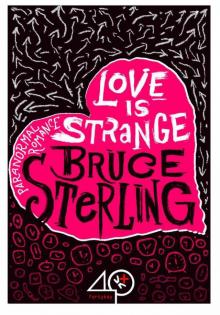 Love Is Strange (A Paranormal Romance)
Love Is Strange (A Paranormal Romance)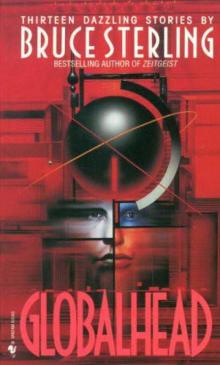 Globalhead
Globalhead Essays. FSF Columns
Essays. FSF Columns The Hacker Crackdown
The Hacker Crackdown Bicycle Repairman
Bicycle Repairman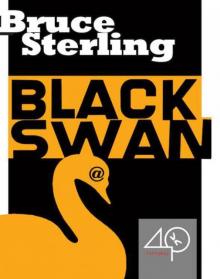 Black Swan
Black Swan Crystal Express
Crystal Express Islands in the Net
Islands in the Net Pirate Utopia
Pirate Utopia GURPS' LABOUR LOST
GURPS' LABOUR LOST The Dead Media Notebook
The Dead Media Notebook Unstable Networks
Unstable Networks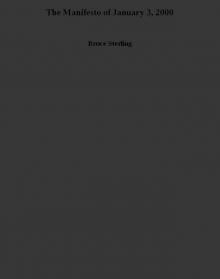 The Manifesto of January 3, 2000
The Manifesto of January 3, 2000 Heavy Weather
Heavy Weather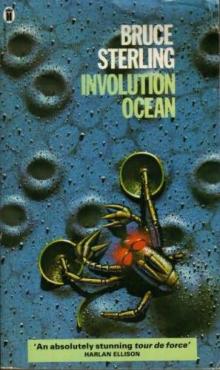 Involution Ocean
Involution Ocean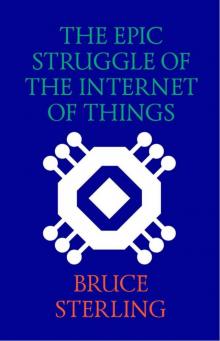 The Epic Struggle of the Internet of Things
The Epic Struggle of the Internet of Things A Good Old-Fashioned Future
A Good Old-Fashioned Future The Littlest Jackal
The Littlest Jackal Zeitgeist
Zeitgeist Totem Poles
Totem Poles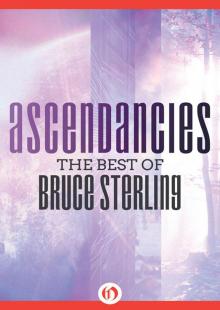 Ascendancies
Ascendancies CyberView 1991
CyberView 1991 War Is Virtual Hell
War Is Virtual Hell Taklamakan
Taklamakan Holy Fire
Holy Fire Cyberpunk in the Nineties
Cyberpunk in the Nineties Schismatrix Plus
Schismatrix Plus The Artificial Kid
The Artificial Kid Essays. Catscan Columns
Essays. Catscan Columns Maneki Neko
Maneki Neko Distraction
Distraction In Paradise
In Paradise Red Star, Winter Orbit
Red Star, Winter Orbit Luciferase
Luciferase